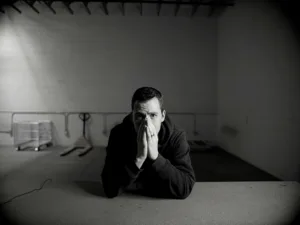Growth, Change, Fulfillment
Many guys are excited about the growth, change and fulfillment that therapy brings. For other men they want to avoid it like the plague. If there is a male in your life who needs therapy but you are struggling with how to approach it with him, this blog on how to get a man to therapy is for you.
At Denver Men’s Therapy, we specialize in therapy for men. Every day we get concerned phone calls from people who have a male in their lives who ask us how to get a man to therapy. They are loving wives, mothers, boyfriends, friends, partners, husbands, fathers and siblings. It’s common for us to hear “he’s such a great guy, but he’s been through so much and he just needs some help. I don’t know what to do.” We are here to tell you that there is hope. Therapy for men can help. One of the biggest hurdles, however, is getting them in the therapy office.
We have written a lot about Therapy for Men. Our blog also covers topics like Men and Depression and EMDR Therapy for Men. These are great reads if the man in your life is already open to the idea of therapy.
Sensitivity and Masculinity
No matter how modern or progressive your man might be, psychotherapy is still a taboo for many guys. Some men were raised to be tough and independent. Their families, communities, and friends modeled a traditional form of masculinity. They learned very early on they must not reveal their sensitive sides. This traditional form of masculinity says a husband or a boyfriend must be able to deal with everything on his own at all times. This includes his own well-being. Guys often take pride in being the provider or “fixer.” This is not a bad thing when it’s balanced with the skill of asking for help when needed. However, many men do not learn this balance. Asking for help feels like a sign of weakness or failure. For these men going to therapy might feel like they failed to fix the problem on their own.
For some men, the idea of therapy means talking about their feelings. Many males are raised without a vocabulary to describe their inner experiences. They struggle to put words to their feelings. In fact, it’s so common we have a term for it; normative male alexithymia. For guys who learned the traditional form of masculinity talking feelings is simply not done because to do so shows vulnerability and weakness.
Psychotherapy involves some talking. Because these men struggle to name their feelings AND need to feel competent at all times, psychotherapy can seem like bringing a knife to a gunfight. In essence, there are plenty of reasons why men might be reluctant to get help. When men don’t take care of their mental health they risk symptoms becoming worse and more chronic. Men in Colorado have a much higher rate of suicide than their female counterparts and the number is rising. Men are in need of mental health services, yet are often likely to avoid seeking services. We find over and over that even the toughest dudes are successful in therapy once they get into the office and learn how therapy can benefit them. So, here’s how to support your man into starting psychotherapy.
Why Do (Some) Men Reject Psychotherapy So Hard?
Before you venture on to getting your man into psychotherapy you should first understand where the problem lies. This is crucial for you to be able to support him in the right way. Otherwise, you risk further withdrawal. The fact of life remains that men aren’t eager to seek help. Some guys would rather wander the desert for forty years than ask for directions or admit that he’s lost.
We love men for their hands-on approach to life. Even nowadays when you can get someone to fix and do almost everything for you, many men still love to build their own houses, computers, the wifi, fix their plumbing, install Windows, and do many other things on their own. However, this self-sufficient attitude also has its dark side if it’s too rigid. The same thing that drives your man not to call a repairman to glue the broken wood cabinet together will make him extremely reluctant to call a psychotherapist when he or your relationship need some gluing too.
We should honor and admire men for their strength and independence. Many men, need to be respected and to respect himself, need to feel be strong, firm, composed, rational and empowered. Guys often learn painful lessons as boys that they can never be seen as momma’s boys, wusses, cowards. If a man shows emotions, it better be anger or some other “manly” feelings. God forbid a man who would cry. Unfortunately, even during the hardest times, you can see men all around the world sucking it up, often times at the detriment to themselves and their loved ones.
If you are anyone is experiencing a mental health crisis contact the Colorado Crisis line at 1-844-493-8255 or call 911.
The Consequences of Stiff Upper Lip
Culturally, both men and women expect men to act like that. It’s really not the healthiest thing from a psychological standpoint. We can see this in the powerful #metoo Movement. Women are finding their voices to fight back against sexual assault and demanding systematic change, as they must. However, we hear very little from men and boys about the sexual abuse they have endured, even when we know that 1 in 6 boys will be sexually abused by age 18. The reason few men disclose their own abuse is the powerful shame and self blame. For these men to admit the abuse may mean to not be a man.
As a result of this keeping-it-all-together imperative, men are prone to many maladaptive coping mechanisms. They tend to withdraw emotionally and socially, get depressed, become angry and irritable, or succumb to different addictions. Not only do men avoid professional help, they usually don’t feel comfortable seeking support from friends and family too. Without social support, mental health problems have a way of becoming overwhelming. Instead of representing an opportunity for personal growth, every crisis can become extremely damaging. Every stress factor jeopardizes the man’s psychological well-being far more than necessary. A loss of a job can easily transform into a nasty divorce over alcohol or drugs addiction and domestic violence. All because they feel they can’t ask for help.
Physically, this emotional habit of not showing one’s feelings also takes its toll. Suppressing feelings for the sake of playing a tough guy increases the risk for many diseases. Yes, cardiovascular disorders come to our mind instantly. But, there’s an opinion among many experts that every disease can be considered psychosomatic, at least to some extent. This is because inadequate coping with stress lowers the body’s ability to fight illness. Chronic stress could very well be the number one killer of an organism’s resilience to different ailments. It systematically lowers the immune system’s response and its efficacy, making the person vulnerable.
When Your Man Is in Need of Psychotherapy
Now you probably understand a bit better how your husband/boyfriend/brother/son may be hardwired, and you most likely get that he’s not trying to be difficult or intentionally shutting you out. It’s not that he doesn’t care about your feelings and needs. His upbringing (and some of his biology) made him that way. So, how to get him to get help when he needs it? There isn’t a cookie-cutter approach to supporting men into psychotherapy. There are some ideas that we work at Denver Men’s Therapy. The most general advice we can give you is this – you know your man best. You know what made him side with you in the past. Now it’s time to use this skill of yours to help him get better. Build on the relationship you have with your man; love, trust and support.
There are many cases when men come to therapy because they were given an ultimatum. Their wives or girlfriends demanded that they get a few sessions of counseling or else they would leave them. This is, simply put, not the greatest idea in the world. Yes, the man will come to see a psychotherapist and possibly even do basic some soul-searching. But the fact remains that he didn’t go to psychotherapy voluntarily. He was forced, and blackmailed to do that, and this is never the right kind of motivation. Not only will he not put his heart into the process; his resistance towards psychotherapy might even increase because it now is associated not only with his earlier reluctance, but also with being coerced into something. You will rob him out of an essential tool that he might need throughout his life. So, here are some basic steps you should try.
1. Knowledge is Power
As we have laid out there are misconceptions among men about counseling. It can be helpful for men to hear that therapy does not need to be a long unending conversation. In fact, at Denver Men’s Therapy not only do we specialize in Therapy for Men we also provide EMDR therapy. This is a powerful therapy that often involves less talking, more structure and clearly defined goals and expectations that can be planned out at the start of therapy. Often men are in EMDR therapy for fewer sessions compared with talk therapy. Men and EMDR therapy is a match made in heaven.
Men also need to hear that therapy is very effective and has very little side effects (at most you might feel a little tired after a session). Guys often understand commitment; commitment to their families, coworkers and friends. Therapy involves commitment as well. They must understand that in order to fully resolve the issues they must commit to completing therapy and reaching their goals.
2. Fight the Stigma
Instead of forcing your partner into counseling, try other approaches. Think of it as any other form of a sales pitch. You first want to educate your audience about the product (see #1). As we have discussed men tend to have a negative view about psychotherapy. There’s a lot of stigma associated with it. Even nowadays people tend to see psychotherapy as a sign that someone is mentally ill. And mental illness has a range of stigma associated with it on its own. None of this is justified, of course, but that’s just how prejudice works. The reality is that we all need support at difficult times in our lives or when things are just not working. We would never tell someone with cancer that they shouldn’t get treatment because it means there weak. The same goes for psychotherapy.
Psychotherapy is for Strong Men
As we already explained, men most often have additional prejudice that comes with their gender. Men sometimes believe that psychotherapy is for girls or for weak men. They believe that psychotherapy is all about talking and nothing but whining about your problems. They also, although they don’t always admit to it, think that they’ll lose your respect if they went to see a psychotherapist.
A major way we fight the stigma is by reframing therapy as an act of strength and bravery. What is more manly than facing your fears head on and solving the problem? Doing nothing is the easy route. Therapy is about taking action.
Therapy is about getting shit done. Plain and simple. Therapy is like the Batcave. It may be helpful to present therapy as a challenge worthy of undertaking. Batman had to overcome loss and pain, but he needed the help of Alfred and The Batcave.
Psychotherapy is an Active Challenge
There are two kinds of information that you can give to him that will make him more willing to go to see a psychotherapist. The first one is about the process itself. Explain to him that, although there truly is a lot of talking in psychotherapy, it is also an active process in which he will need to do some serious work. He will like that. Depending on the kind of psychotherapy, he can expect homework, assignments, and very concrete tasks, not mere chitter chatter. Also, he will not sit there and complain. He will receive a safe space in which his feelings and dilemmas will be respected. But he will not get a warm hug and a pat on his back. He will be invited to become a proactive agent in his own change. When explained like that, psychotherapy becomes less intimidating for most men. They enjoy such active challenge. And they come to appreciate the accepting environment of a psychotherapist’s office too.
3. Offer Additional Support and Reassure Him of Your Love
When you get these misconceptions about psychotherapy out of the way, you can then move on to more intimate (unspoken) questions. As we said, your guy might be secretly afraid that you’ll think less of him if he admits to needing help. Even more so if he goes and sees a professional for it. His masculinity might be in danger in his eyes. This is where all your warmth and love should come to the scene.
There are many cases in which psychotherapy comes after numerous marital or relationship problems. Sometimes they are the cause of his need for counseling, sometimes they are a consequence, and sometimes they just follow along. Understandably, you have your own emotional problems and resentments that you need to deal with at that stage. And you should, by all means, take good care of yourself. At Denver Men’s Therapy, we work with loved ones as well.
He Needs You Now
This is also the time when you should reach in and find energy and selflessness in your love for your man. He needs you now, and he is probably having harder time with it all given all that we discussed earlier. So, reassure him of your love. Dismiss his fears that you’ll love him less or find him less attractive. Explain to him how you see psychotherapy. Odds are he’s not aware of the fact that you’ll, in fact, respect him even more if he went into counseling.
4. Respect His Need to Talk, and His Need not to
Once your husband or boyfriend starts seeing a psychotherapist, all sorts of changes could occur. You might see him starting to open up. He could be genuinely amazed by the process. And he could find himself surprised by different experiences or thoughts that surfaced during the sessions. Forgotten traumas may emerge. This is all part of the process and he could feel the urge to share it all with you. This is great for him and your relationship. Some women can feel a bit overwhelmed by this avalanche of feelings (not always positive) and dilemmas. If you want to offer your man authentic support, be there for him whenever he needs to talk it all over with you. This is an amazing time to reconnect and to learn about him. You will both go through his process of self-discovery, and this is an astoundingly valuable experience for you as a couple. You don’t necessarily need to have constructive comments or thoughts. Just let him talk as much as he needs about the psychotherapy, his insights, or his past.
You’re an Important Part of his Life
Sometimes, you’ll be the subject of your partner’s deliberations. You’re an important part of his life and as such you’ll surely appear in both his thoughts and his sessions with his psychotherapist. This is when you yourself shouldn’t feel intimidated by new elements that could appear in your man’s view of things. You can rest assured that all of the work that he does with his psychotherapist can have only a positive impact on your relationship. Even if it doesn’t seem so at one point. Trust him trust the process and try and be a receptive listener.
Finally, your man might also not want to discuss anything with you. He could become more tongue-tied than ever, at least for some time. This only means that the process of psychotherapy affects him, and he needs time to process it. Don’t worry and allow him the space that he needs. At the end, he will surely share his (positive) change with you, and continue sharing it for the years to come.
Get Him in the Door
At Denver Men’s Therapy, one of our motto’s is “Get Him In The Door!” It’s important to understand that some men avoid therapy because of powerful cultural norms, not because they are being difficult. Therapy for Men is powerful, transformative and life-saving. If you can get him in the therapy door we can take it from there. Our expert team of Men’s Therapists provide specialized therapy for men.
Call today to schedule an appointment for yourself or the man in your life. We have weekday and weeknight appointments open. We will take it from there!






